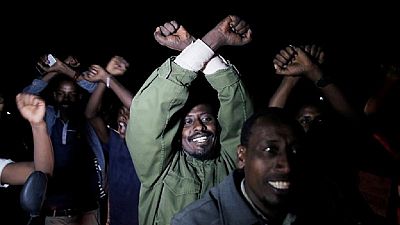"Ethiopia ruling party to pick new premier next week
ByAgencies -February 24, 2018
Awramba Times
Ethiopia’s ruling coalition will meet to choose a new prime minister next week, a party official said on Saturday.
Hailemariam Desalegn resigned as prime minister last week after ordering a mass prisoner amnesty and days of protest in Africa’s second most-populous country. A state of emergency was declared the following day.
The 180-member council of the ruling Ethiopian People’s Revolutionary Democratic Front (EPRDF) would decide on his replacement, said Kassahun Gofi, publicity chief for the largest of the four parties in the coalition, the Oromo Peoples’ Democratic Organisation (OPDO).
“It’s tentatively scheduled for Wednesday,” Kassahun told AFP in an interview.
Kassahun also said his party backed the state of emergency, even though it suspends a number of constitutional rights and is partly aimed at the restive Oromia region the OPDO represents.
Ethiopia’s constitution gives parliament 15 days to approve the emergency decree of February 16.
“As a party, we support the state of emergency,” Kassahun said.
The parties within the coalition have jockeyed for position since Hailemariam’s resignation, which was rumoured for months but ultimately came the day after a no-confidence vote by his party in the EPRDF coalition, a government official told AFP on condition of anonymity.
This week, the OPDO elevated a high-ranking official, Abiy Ahmed, to the position of chairperson in a move believed to clear the way for him to stand for prime minister.
“We are ready to simply present a potential candidate at the prime minister level,” Kassahun said. “If it is the will of all parties, Dr. Abiy will be elected.”"
'via Blog this'
- Security forces instructed to use ‘all necessary measures’
- Ethiopia’s government declared a state of emergency Feb. 16
Ethiopian authorities ordered the country’s security forces to “take all the necessary measures” to deal with anti-government agents in the restive Oromia region.
The so-called Command Post, which is administering a state of emergency declared on Feb. 16, must deal with “illegal forces” in Oromia if they “do not refrain from their destructive actions immediately,” according to a statement published Tuesday by the ruling-party funded Fana Broadcasting Corp.
The government has been struggling for more than two years to end sporadic and often deadly anti-government protests in the Oromia and Amhara regions. The Oromo and Amhara communities together make up more than half of Ethiopia’s population, Africa’s largest after Nigeria. Activists from both groups claim that minority ethnic Tigrayans, who are about 6 percent of the population, dominate an authoritarian government.
One person was killed this week and seven were wounded as protests continue in Nekemte, an Oromia market town about 242 kilometers (151 miles) west of the capital, Addis Ababa, Oromia spokesman Addisu Arega said in a Facebook post Tuesday, citing reports received by the regional government.
‘Angry Population’
Government forces blocked leaders of the opposition Oromo Federalist Congress, including Chairman Merera Gudina and Secretary-General Bekele Gerba from entering Nekemte on Sunday, said Beyene Petros, who heads the Medrek coalition of opposition parties that includes the OFC. Merera was freed from prison in January and Bekele this month as part of a mass release of more than 7,000 detainees first announced by the government in January.
“The population is angry and reacting,” Beyene said by phone from Addis Ababa. “The population was waiting to receive the leaders of the Oromo Federalist Congress.”
Calls to the mobile phones of Merera and Information Minister Negeri Lencho didn’t connect when Bloomberg sought comment.
Bekele and Merera “had to be sent back to Addis,” according to Beyene. “Since we are under a state of emergency, under that kind of embargo, no activities are allowed.”
Ethiopia, Africa’s fastest-growing economy over the past decade, is a key U.S. ally in its battle against al-Qaeda in the Horn of Africa. Home to more than 100 million people, the $72 billion economy has drawn investors including General Electric Co., Johannesburg-based Standard Bank Group and hundreds of Chinese companies.
The U.S. on Feb. 17 said it strongly disagreed with Ethiopia’s decision to impose a state of emergency that “includes restrictions on fundamental rights such as assembly and expression.”

 The European Union (E.U.) has cautioned Ethiopian government over the decision to impose a state of emergency on the heels of promised political reforms.
The European Union (E.U.) has cautioned Ethiopian government over the decision to impose a state of emergency on the heels of promised political reforms.

